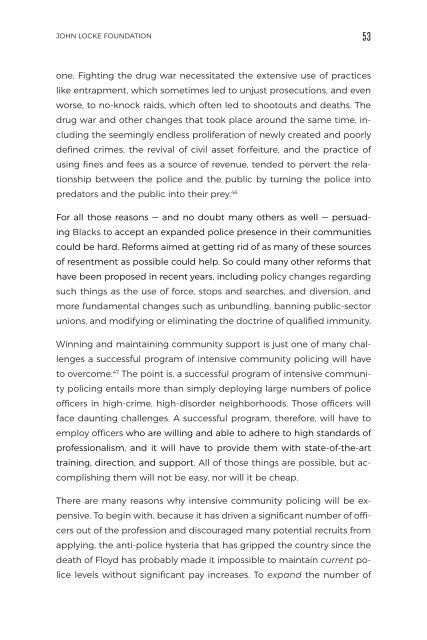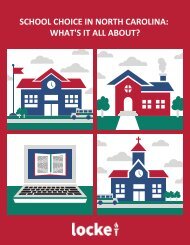Keeping the Peace Through Intensive Community Policing
As crime soars and the breakdown of public order takes its toll on our country, analysis from the John Locke Foundation signals it’s time to adopt a different approach to crime control, one that shifts the focus further upstream, looking at prevention models, rather than exclusively on punitive measures. In this July 2021 report, John Locke Foundation researcher and author Jon Guze explains that the current focus of catching, convicting, and punishing perpetrators after crimes have been committed has come with enormous economic and social costs. However, intensive community policing has proven successful at deterring crime and maintaining order, which leads to safer communities and fewer people living in poverty. Guze recommends a four-pronged plan to move forward with community policing: (1) hire more police officers (2) increase the pay for police officers (3) arm police officers with state-of-the-art training, direction, and support (4) deploy police officers as “peacekeepers” in communities that suffer most from crime and disorder.
As crime soars and the breakdown of public order takes its toll on our country, analysis from the John Locke Foundation signals it’s time to adopt a different approach to crime control, one that shifts the focus further upstream, looking at prevention models, rather than exclusively on punitive measures. In this July 2021 report, John Locke Foundation researcher and author Jon Guze explains that the current focus of catching, convicting, and punishing perpetrators after crimes have been committed has come with enormous economic and social costs.
However, intensive community policing has proven successful at deterring crime and maintaining order, which leads to safer communities and fewer people living in poverty. Guze recommends a four-pronged plan to move forward with community policing:
(1) hire more police officers
(2) increase the pay for police officers
(3) arm police officers with state-of-the-art training, direction, and support
(4) deploy police officers as “peacekeepers” in communities that suffer most from crime and disorder.
Create successful ePaper yourself
Turn your PDF publications into a flip-book with our unique Google optimized e-Paper software.
JOHN LOCKE FOUNDATION<br />
53<br />
one. Fighting <strong>the</strong> drug war necessitated <strong>the</strong> extensive use of practices<br />
like entrapment, which sometimes led to unjust prosecutions, and even<br />
worse, to no-knock raids, which often led to shootouts and deaths. The<br />
drug war and o<strong>the</strong>r changes that took place around <strong>the</strong> same time, including<br />
<strong>the</strong> seemingly endless proliferation of newly created and poorly<br />
defined crimes, <strong>the</strong> revival of civil asset forfeiture, and <strong>the</strong> practice of<br />
using fines and fees as a source of revenue, tended to pervert <strong>the</strong> relationship<br />
between <strong>the</strong> police and <strong>the</strong> public by turning <strong>the</strong> police into<br />
predators and <strong>the</strong> public into <strong>the</strong>ir prey. 46<br />
For all those reasons — and no doubt many o<strong>the</strong>rs as well — persuading<br />
Blacks to accept an expanded police presence in <strong>the</strong>ir communities<br />
could be hard. Reforms aimed at getting rid of as many of <strong>the</strong>se sources<br />
of resentment as possible could help. So could many o<strong>the</strong>r reforms that<br />
have been proposed in recent years, including policy changes regarding<br />
such things as <strong>the</strong> use of force, stops and searches, and diversion, and<br />
more fundamental changes such as unbundling, banning public-sector<br />
unions, and modifying or eliminating <strong>the</strong> doctrine of qualified immunity.<br />
Winning and maintaining community support is just one of many challenges<br />
a successful program of intensive community policing will have<br />
to overcome. 47 The point is, a successful program of intensive community<br />
policing entails more than simply deploying large numbers of police<br />
officers in high-crime, high-disorder neighborhoods. Those officers will<br />
face daunting challenges. A successful program, <strong>the</strong>refore, will have to<br />
employ officers who are willing and able to adhere to high standards of<br />
professionalism, and it will have to provide <strong>the</strong>m with state-of-<strong>the</strong>-art<br />
training, direction, and support. All of those things are possible, but accomplishing<br />
<strong>the</strong>m will not be easy, nor will it be cheap.<br />
There are many reasons why intensive community policing will be expensive.<br />
To begin with, because it has driven a significant number of officers<br />
out of <strong>the</strong> profession and discouraged many potential recruits from<br />
applying, <strong>the</strong> anti-police hysteria that has gripped <strong>the</strong> country since <strong>the</strong><br />
death of Floyd has probably made it impossible to maintain current police<br />
levels without significant pay increases. To expand <strong>the</strong> number of











